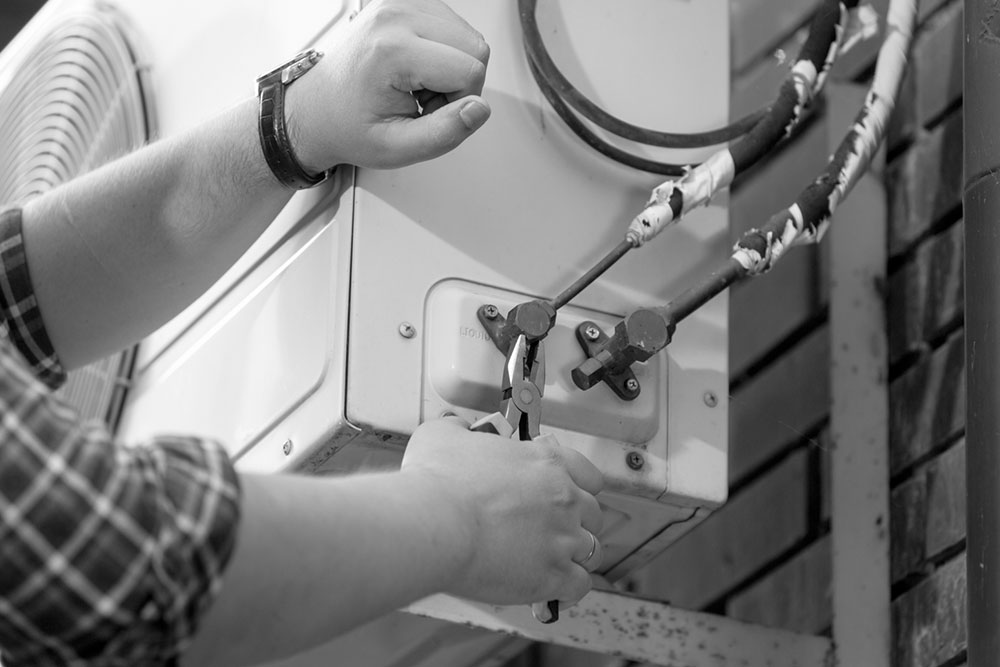13 air conditioner mistakes that waste energy and money

Air conditioners are not only effective in facilitating cool air but also in removing excess moisture, dehumidifying the room, and removing mold and pollutants from the air. Such functions help manage asthma attacks and other respiratory conditions among those prone to these diseases. Maintaining an air conditioner is important to ensure its optimal functioning over time. That said, one must avoid a few common mistakes while installing and maintaining an AC.
1. Not cleaning the coils and fins of the AC
The coils and fins of an air conditioning system help absorb heat effectively. With time, dust and grime accumulate in the air conditioner’s coils and fins, reducing its efficiency and increasing maintenance costs in the long run. Therefore, it is important to regularly clean the coils and fins of an AC, particularly when the weather is windy or stormy.
2. Ignoring the drain
Drains redirect accumulated water outside the premises where they are installed and prevent the development of mold and mildew. If the air conditioner’s drain gets clogged with time, it can cause severe damage to the surrounding areas, including walls and floors. One should check the AC’s drain every now and then and promptly treat any drainage issues to prevent such damage.
3. Lowering the AC temperature too much
Contrary to popular belief, setting the AC temperature very low does not ensure faster cooling. In fact, air conditioners require just as much energy to lower the temperature to one or two degrees as they do to lower it by 10-15 degrees. Therefore, lowering the AC temperature makes no significant difference in terms of cooling. Moreover, lowering the temperature by one unit increases energy consumption by 6 percent. So, it is more cost-effective to maintain AC temperature rather than change it frequently.
4. Not using ceiling or table fans
Any type of fan can considerably help with ventilation and ensure air cooling in a room. It also reduces the need to have the AC turned on at all times. Installing two to three ceiling fans in large rooms and at least one fan in smaller ones can help reduce energy consumption and lower electricity bills.
5. Not placing the thermostats in the right place
If a thermostat is placed in an area receiving direct sunlight or near a lamp or some other source of light, it could affect the thermostat readings and exert pressure on the air conditioning system, even if the weather is actually cool. Hence, it is important to install thermostats at the right locations to prevent the AC from overworking.
6. Blocking AC vents
Sometimes, one may accidentally place a piece of furniture in front of the AC vent without realizing that the vent is getting blocked. Blocking the AC vent can reduce air circulation considerably, causing one to have the AC turned on for longer periods than required. For this reason, one should ensure that the AC vents are not obstructed.
7. Forgetting to turn off the AC when stepping out
One of the most common mistakes that can considerably increase energy consumption is forgetting to turn off the AC when it is not in use. Having the AC turned on for long periods can cause one’s electricity bills to shoot up significantly. It is important to turn off the AC each time before stepping out, even if it is for a brief while.
8. Not having a programmable thermostat
It is common for people to forget to adjust their thermostat when leaving the house in a hurry. However, installing a programmable thermostat can automatically regulate the temperature while away, resulting in significant savings on electricity bills.
9. Not getting the AC checked and serviced regularly
Servicing an air conditioning system can help detect any issues and remedy them promptly. It can also help clean the various components of an AC and increase its efficiency and durability. It is advisable to get an AC system serviced at least once a year and more frequently if the AC is older.
10. Not having blinds drawn
Bright sunlight can considerably increase pressure on one’s air conditioning system and raise electricity bills. Blinds and curtains protect one’s home from direct sunlight and keep it cool throughout, particularly during the summer. One should have the blinds drawn when the AC is turned on during the day.
11. Not closing the windows regularly
It is important to close the windows of a room each time the AC is turned on, as keeping them open can cause excess moisture to enter the home. This increases pressure on the AC system, causing electricity bills to shoot up.
12. Installing an oversized AC
An oversized air conditioning unit causes the room to cool down unusually fast, which reduces the coil’s ability to condense water efficiently. Consequently, the moisture is redirected to the room, causing an increase in energy consumption.
13. Turning the AC on during winters
Turning on the AC during snowy weather can unnecessarily increase energy consumption. Instead, it is best to enjoy naturally cool weather whenever possible rather than having the AC turned on throughout the year. If the nights are colder than the days, the best option is to turn them on only during the day. This simple change can help reduce energy usage and contribute to a more sustainable future.